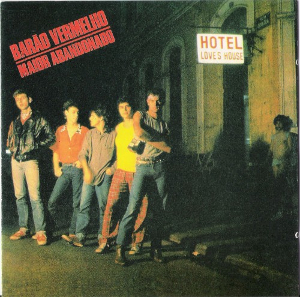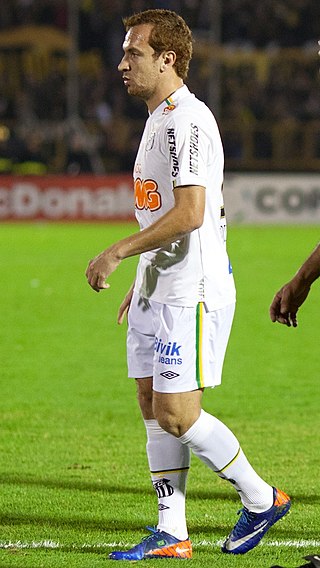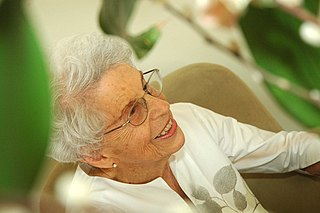Related Research Articles
Angelic Upstarts are an English punk rock / Oi! band formed in South Shields in 1977. AllMusic calls them "one of the period's most politically charged and thought-provoking groups". The band espouse an anti-fascist and socialist working class philosophy, and have been associated with the punk and skinhead subcultures.

Barão Vermelho is a Brazilian rock band. Formed in 1981 in Rio de Janeiro, it was originally led by songwriting duo Cazuza (singer) and Roberto Frejat (guitarist), who assumed the vocals after Cazuza's departure in 1985. Frejat left the band in 2017 and was replaced by Rodrigo Suricato. They are considered one of the most influential bands in Brazilian rock.

Agenor de Miranda Araújo Neto, better known as Cazuza, was a Brazilian singer and songwriter, born in Rio de Janeiro. Along with Raul Seixas, Renato Russo and Os Mutantes, Cazuza, both while fronting Barão Vermelho and at solo career, is considered one of the best exponents of Brazilian rock music. In his 9-year career, he sold more than 5 million albums and achieved 11 number one singles and 18 Top 10 singles in Brazil.
Brilliant were a British pop/rock group active in the 1980s. Although not commercially successful and mauled by the critics, they remain notable because of the personnel involved – Martin Glover a.k.a. Youth of Killing Joke and subsequently a top producer/remixer; Jimmy Cauty, later to find fame and fortune as one half of The KLF; and Ben Watkins a.k.a. Juno Reactor. Equally notable was their management, their record company A&R manager, and songwriting and production team.
The National Prize for Arts and Sciences is awarded annually by the Government of Mexico in six categories. It is part of the Mexican Honours System and was established in 1945. The prize is a gold medal and 520,000 pesos.

Maior Abandonado is the third album by Brazilian rock band Barão Vermelho, released in 1984. It is their most critically acclaimed and generally considered their best album. It contains their biggest hit "Bete Balanço". This was the last album with singer and main lyricist Cazuza, who left the band in 1985.

Zeus B. Held is a German music producer and musician, known for his work in the 1970s, 1980s and 1990s. He was involved with several artists of the krautrock, disco, and new wave era, such as Birth Control, Rockets, Gina X Performance, Dead Or Alive, John Foxx, Fashion, and Men Without Hats on their successful album Pop Goes the World.

Mad Max is a German hard rock band from Münster. In 1988, the band consisted of Michael Voss (vocals), Jürgen Breforth (guitars), Roland Bergmann and Axel Kruse (drums). Mad Max's self-titled release was in 1982. They faded away in 1989. Voss and Breforth reunited and put out a comeback album in 1999. At the beginning of 2015, bassist Roland Bergmann left Mad Max, leaving Breforth as the only original member of the band.

Bete Mendes is a Brazilian actress and politician.
"Eduardo e Mônica" is a song from Brazilian rock band Legião Urbana's 1986 album Dois, released as promo single. It tells a romantic story centered on a couple formed by the 16-year-old Eduardo and the older college student Mônica, who are very different from each other.

José Eduardo Bischofe de Almeida or simply Zé Eduardo, also known as Zé Love, is a Brazilian footballer who plays for Brasiliense FC.

Thaís de Campos is a Brazilian actress, producer, and film director.

Norbert Susemihl is a German trumpeter, drummer, singer, and bandleader. He is a promoter of New Orleans Jazz and New Orleans Music.
Agentss was a short-lived Brazilian new wave band formed in São Paulo in 1980, famous for their quirky science fiction-influenced visuals and lyrics which were sung in a dialect invented by frontman Kodiak Bachine called "elektrotranzlyriks" – a mixture of words in Portuguese, French, German, English and "extraterrestrial idioms".

Professor Digital/Cidade Industrial is an extended play by Brazilian new wave band Agentss. It was released through WEA in 1983, and was their second and last release before their break-up in the same year.
Lael Alves Rodrigues was a Brazilian film director, producer, editor and screenwriter.
Zero, stylized in all capital letters as ZERØ, is a Brazilian rock band formed in 1983 in São Paulo and based in Rio de Janeiro since 1998, widely considered to be major forerunners of the New Romantic movement in Brazil.
Os Mulheres Negras are a Brazilian experimental rock duo formed in São Paulo in 1985, by musicians André Abujamra and Maurício Pereira. Self-described as "the world's third smallest big band", they are known for their eclectic musical style characterized by humorous, "cartoonish" lyrics and elaborate theatrical performances which attained them a passionate cult following.

Eva Sopher was a Brazilian theatre manager in Porto Alegre. She renovated the São Pedro Theatre and ran it for 41 years.
References
- ↑ "Azul 29 - compactos - 1983/84 - São Paulo - Brasil". Mundoestranhodepb.blogspot.com. 1 January 2009. Retrieved 14 September 2020.
- ↑ ":: Azul 29 - Entrevista com Thomas Bielefeld ::". Overmundo.com.br. Retrieved 14 September 2020.
- ↑ KODIAK BACHINE – Agentss Archived 2014-11-04 at the Wayback Machine (in Portuguese)
- ↑ "Various - Bete Balanço - Trilha Sonora Do Filme". Discogs.com. Retrieved 14 September 2020.
- ↑ "Johnny Hansen". Facebook.com. Retrieved 14 September 2020.
- ↑ "Morre Thomas Bielefeld, vocalista e tecladista do Azul 29". Ligadoamusica.com.br. 18 August 2016. Retrieved 14 September 2020.